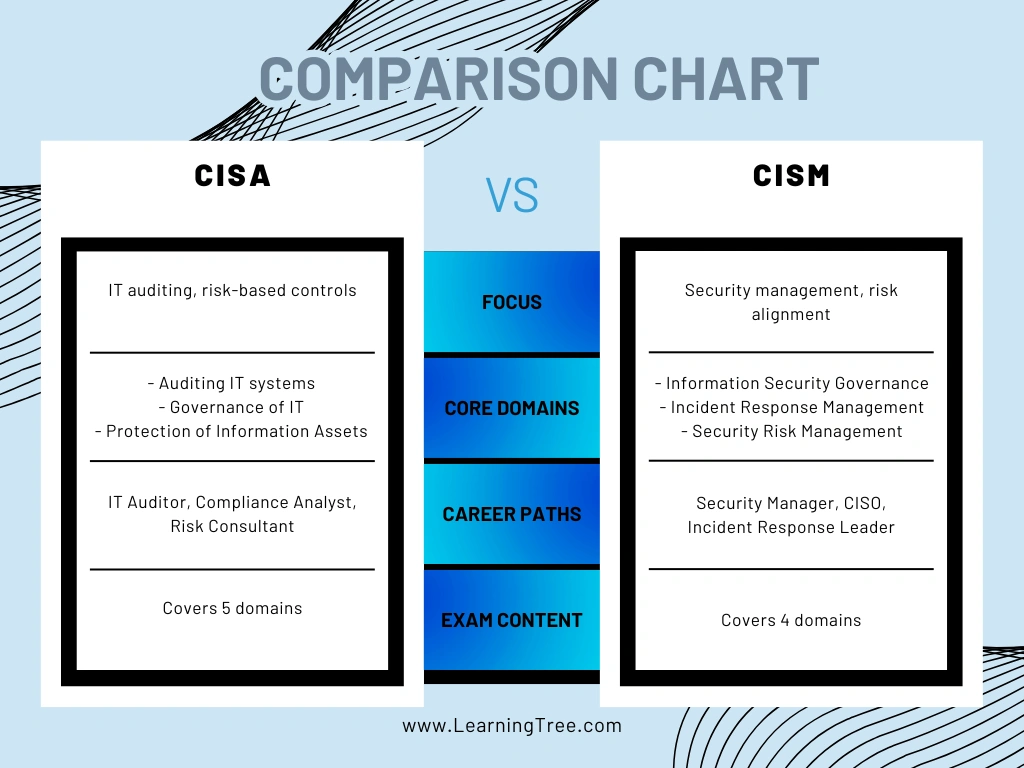Businesses today face an evolving tapestry of digital risks and compliance requirements. From cyberattacks to regulatory pressures, the interconnected nature of today's IT environment demands seamless collaboration between IT auditors and information security managers. Two certifications — Certified Information Systems Auditor (CISA) and Certified Information Security Manager (CISM) — stand out as benchmarks for expertise in these fields.

While they serve distinct purposes, their synergy can yield powerful advantages for organizations seeking to bolster their cyber resilience and operational performance. This article explores how the CISA and CISM certifications complement each other, examines their differences, and provides actionable insights for professionals and organizations looking to gain an edge.
Introduction to CISA and CISM Certifications
Overview of CISA Certification
The Certified Information Systems Auditor (CISA), offered by ISACA, is a globally recognized credential specializing in IT auditing, assurance, and governance. This certification equips professionals with the expertise to:
- Identify vulnerabilities in IT systems.
- Ensure compliance with international IT standards.
- Conduct risk-based audits across enterprise systems.
CISA-certified professionals play a critical role in evaluating whether an organization's IT infrastructure is secure, compliant, and delivering business value.
Overview of CISM Certification
The Certified Information Security Manager (CISM) certification, offered by ISACA, is a highly regarded credential tailored for information security management professionals. This certification emphasizes:
- Developing leadership expertise in key areas such as risk mitigation and incident response.
- Designing and implementing comprehensive, enterprise-wide security programs.
CISM-certified professionals are adept at aligning security initiatives with business goals, enabling them to create strategies and policies that effectively protect organizational assets.
The Value of Both Certifications
While each certification represents a gold standard in its respective field, combining them creates a powerful synergy. Together, they form the foundation of a robust, integrated enterprise IT strategy, fostering collaboration between IT governance and security leadership for optimal business outcomes.
Understanding the Synergy Between CISA and CISM
Think of CISA and CISM as two sides of the same coin. CISA brings a systematic view to auditing and compliance, while CISM focuses on the proactive management of security risks. By uniting these perspectives, businesses can better protect and optimize IT systems.
Complementary Expertise
- Risk Management:
CISA professionals pinpoint risks during audits, while CISM managers design strategies to mitigate those risks effectively.
- Incident Response and Analysis:
When a security incident occurs, a combined team leverages CISA skills for thorough post-incident analysis and CISM skillsets for preemptive measures and swift recovery.
- Policy and Compliance Alignment:
CISM practitioners draft policies, and CISA professionals assess their compliance and effectiveness. Together, they ensure both proactive planning and operational accountability.
Real-World Scenarios
- Data Breach Prevention:
A CISM-certified manager develops robust access control policies, while a CISA-certified auditor evaluates whether access logs are being reviewed adequately.
- Regulatory Compliance:
A business faces strict GDPR compliance requirements. A CISA professional ensures IT systems meet these regulations, while a CISM expert enforces data protection measures to avoid penalties.
By combining forces, IT auditors and security managers can create a proactive, layered defense strategy that safeguards enterprise operations.
CISA vs. CISM: Detailed Comparison
While both certifications are integral to enterprise IT, they cater to distinct roles and objectives.

Career Opportunities
CISA certification commonly leads to roles like IT Auditor, Compliance Specialist, or Program Manager. Meanwhile, CISM certification helps professionals transition into strategic roles such as Information Security Manager or even Chief Information Security Officer (CISO).
Together, these certifications combine tactical auditing roles with strategic, long-term security planning capabilities.
Career Advancement and Salaries with CISA and CISM
Earning CISA or CISM credentials significantly enhances career prospects. According to ISACA’s data, professionals with these certifications report measurable career gains.
- CISA-certified professionals enjoy an average salary of over $149,000 annually.
- CISM holders are recognized as some of the highest paid IT professionals globally, with 42% reporting pay raises after certification.
These certifications not only validate expertise but also provide networking opportunities through ISACA chapters worldwide, unlocking paths to mentorships, collaborations, and leadership roles.
Final Thoughts
Both CISA and CISM certifications bring unique value to IT professionals. CISA hones your ability to identify risks and evaluate IT systems, while CISM develops the leadership skills necessary for designing and executing effective IT security strategies.
Taken together, they provide a holistic skillset that empowers you to better serve your organization’s needs while accelerating your career growth.
If you’re ready to elevate your professional expertise, explore the benefits of pursuing these certifications. Start by reading ISACA’s official candidate guides or enrolling in preparation courses. With the right training, you’ll unlock new career opportunities and make a measurable impact on your organization.


